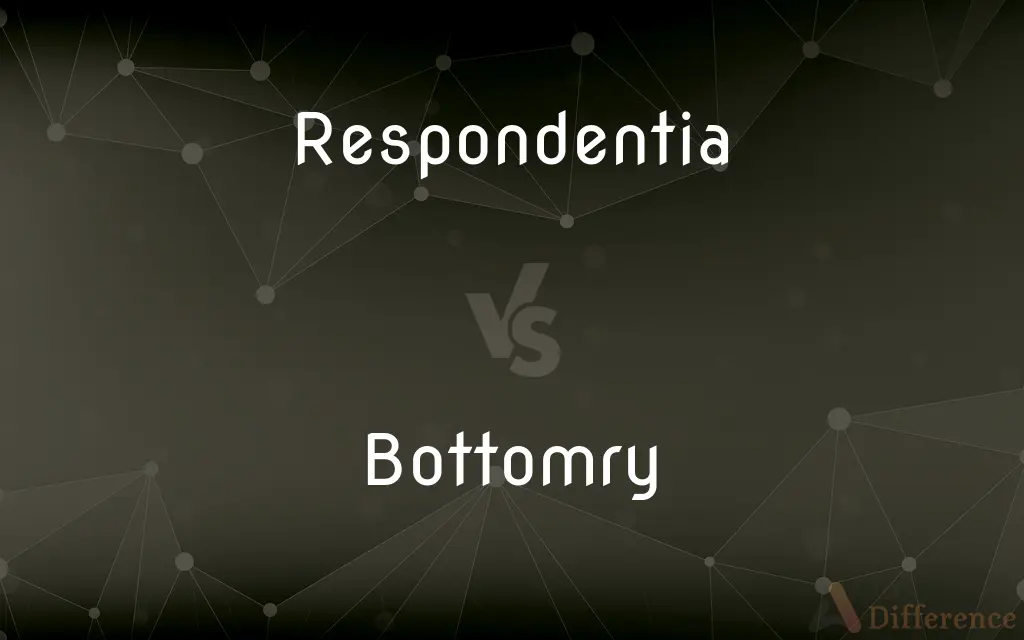Respondentia vs. Bottomry — What's the Difference?
By Tayyaba Rehman & Fiza Rafique — Updated on April 1, 2024
Respondentia is a loan secured by cargo value, repayable upon safe cargo arrival, while bottomry involves a loan secured by a ship itself, repayable only if the ship safely reaches its destination.

Difference Between Respondentia and Bottomry
Table of Contents
ADVERTISEMENT
Key Differences
Respondentia refers to a financial arrangement where a loan is secured against the cargo of a ship. The borrower is required to repay the loan upon the safe arrival of the cargo at its destination. On the other hand, bottomry is a similar type of loan but is secured against the ship rather than the cargo. The repayment of this loan is contingent upon the safe arrival of the ship at its intended destination.
While respondentia loans are specifically tied to the value of the cargo, allowing merchants to raise funds based on the cargo they are transporting, bottomry loans are based on the value of the ship itself. This distinction makes bottomry loans potentially larger in value, given that the ship is usually more valuable than its cargo.
In the case of respondentia, the risk to the lender is primarily associated with the loss or damage of the cargo. Whereas in bottomry, the risk is tied to the ship's voyage and its safe arrival, which includes potential threats like piracy, weather, and other perils at sea.
Interest rates for respondentia loans can vary significantly depending on the perceived risk of the cargo's voyage. Similarly, bottomry loans often command high interest rates, reflecting the high risk of maritime lending, where the entire investment hinges on the successful completion of a perilous journey.
The legal framework surrounding respondentia and bottomry loans has evolved significantly, but both remain important concepts in maritime law. While modern shipping and insurance practices have reduced the prevalence of such arrangements, they highlight historical methods of financing maritime ventures.
ADVERTISEMENT
Comparison Chart
Secured Against
Cargo's value
Ship's value
Loan Repayment
Upon cargo's safe arrival
Upon ship's safe arrival
Primary Risk
Loss or damage to cargo
Ship's voyage and perils
Interest Rate
Varied, based on cargo risk
High, reflecting voyage risk
Historical Significance
Financing based on cargo
Financing based on ship
Compare with Definitions
Respondentia
A loan secured against the value of a ship's cargo.
The merchant secured a respondentia loan to finance his cargo of spices.
Bottomry
A maritime loan secured by the ship itself.
The captain took out a bottomry loan to repair his vessel.
Respondentia
Subject to maritime law regulations.
The terms of the respondentia loan were carefully drafted to comply with maritime law.
Bottomry
Repayment is only required if the ship arrives safely.
The devastating storm meant the bottomry loan did not need to be repaid.
Respondentia
Repayment is contingent upon the safe arrival of the cargo.
He breathed a sigh of relief when the cargo arrived safely, knowing the respondentia loan could now be repaid.
Bottomry
Allows ship owners to finance expeditions without upfront capital.
Bottomry loans enabled explorers to venture into uncharted territories.
Respondentia
Historically used by merchants to finance voyages.
Respondentia loans were common among 18th-century spice traders.
Bottomry
Governed by ancient maritime laws.
The bottomry contract was based on principles dating back to the Lex Mercatoria.
Respondentia
Interest rates depend on the cargo and voyage risk.
The respondentia loan had a high interest rate due to the treacherous sea route.
Bottomry
Risk is assessed based on the ship and its voyage.
Due to the pirate-infested waters, the bottomry loan's interest rate was exceptionally high.
Respondentia
A loan upon goods laden on board a ship.
Bottomry
A bottomry, or bottomage, is an arrangement in which the master of a ship borrows money upon the bottom or keel of it, so as to forfeit the ship itself to the creditor, if the money with interest is not paid at the time appointed at the ship's safe return.This occurs, for example, where the ship needs urgent repairs during the course of its voyage or some other emergency arises and it is not possible for the master to contact the owner to arrange funds, allowing the master to borrow money on the security of the ship or the cargo by executing a bond. Where the ship is hypothecated, the bond is called a bottomry bond.
Respondentia
A loan upon goods laden on board a ship. It differs from bottomry, which is a loan on the ship itself.
Bottomry
(nautical) An early form of maritime contract in which the owner of a ship could borrow money using the ship as collateral.
Bottomry
A contract in the nature of a mortgage, by which the owner of a ship, or the master as his agent, hypothecates and binds the ship (and sometimes the accruing freight) as security for the repayment of money advanced or lent for the use of the ship, if she terminates her voyage successfully. If the ship is lost by perils of the sea, the lender loses the money; but if the ship arrives safe, he is to receive the money lent, with the interest or premium stipulated, although it may, and usually does, exceed the legal rate of interest. See Hypothecation.
Common Curiosities
How is the interest rate for a bottomry loan determined?
The interest rate reflects the perceived risk of the voyage and the ship's safe arrival.
What happens if the cargo is lost at sea under a respondentia agreement?
The loan does not need to be repaid if the cargo does not arrive safely.
Can bottomry loans cover voyage expenses other than ship repairs?
Yes, they can also finance the voyage itself and other related expenses.
What distinguishes bottomry from respondentia?
Bottomry is secured by the ship itself, while respondentia is secured by the cargo.
Are respondentia loans still common?
No, modern insurance and financing methods have largely replaced respondentia loans.
How do modern financing methods compare to respondentia and bottomry?
Modern methods are less risky and more regulated, often involving insurance.
What is respondentia?
Respondentia is a loan secured by a ship's cargo, repayable upon the cargo's safe arrival.
Can a ship be used as collateral in both respondentia and bottomry loans?
No, in respondentia, only the cargo serves as collateral; in bottomry, it's the ship.
Is bottomry considered a high-risk loan?
Yes, due to the uncertainty of maritime voyages, it's high-risk.
Were respondentia and bottomry loans used in ancient times?
Yes, they are ancient financing methods, documented in historical texts.
What happens to a bottomry loan if the ship is captured by pirates?
The loan does not need to be repaid, as the ship did not arrive safely at its destination.
What role does maritime law play in these financial arrangements?
Maritime law governs the terms and enforcement of both loan types.
What risks affect the interest rates of respondentia loans?
Cargo value, voyage distance, and sea perils influence the rates.
How does the repayment obligation differ between the two?
Bottomry requires repayment only if the ship arrives safely, while respondentia depends on the cargo's safe arrival.
Can the same voyage be financed with both a respondentia and a bottomry loan?
Yes, it's possible to use both, with one securing the cargo and the other the ship.
Share Your Discovery

Previous Comparison
Tartrate vs. Citrate
Next Comparison
Certificate vs. TranscriptAuthor Spotlight
Written by
Tayyaba RehmanTayyaba Rehman is a distinguished writer, currently serving as a primary contributor to askdifference.com. As a researcher in semantics and etymology, Tayyaba's passion for the complexity of languages and their distinctions has found a perfect home on the platform. Tayyaba delves into the intricacies of language, distinguishing between commonly confused words and phrases, thereby providing clarity for readers worldwide.
Co-written by
Fiza RafiqueFiza Rafique is a skilled content writer at AskDifference.com, where she meticulously refines and enhances written pieces. Drawing from her vast editorial expertise, Fiza ensures clarity, accuracy, and precision in every article. Passionate about language, she continually seeks to elevate the quality of content for readers worldwide.
















































